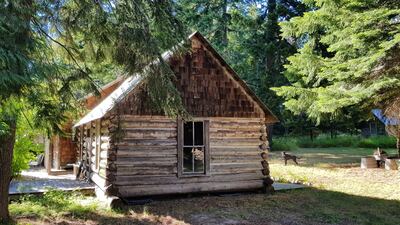I met Christina and her mother Katherine in Singapore on Christmas Day 2005 at a low-key restaurant on Arab Street in Kampong Glam. These are the Americans you want to meet on the road, smart people, well travelled and usually, well-off, although they eschew luxury hotels for more stimulating experiences.
I was on my way from India to Bangkok, and Christina recommended a great guesthouse there called Shanti Lodge, where we met up a few days later and toured the city together. They urged me to visit them at home in Oregon, where they said they had cabins on a remote farm. A couple of years later, Christina got a job at the Esalen Institute, a retreat in California where activities include workshops called Forgiveness, Compassion and Radical Aliveness.
Then, last year, after 10 years at Esalen, Christina returned to Oregon, and I realised I'd be passing through. It was cabin time. She had warned me that it was "off the grid", which means off the electricity and landline phone grids, although in this case it also means without mobile phone reception. "That's fine," I said."Great."
So, I drove down to The Dalles, a small town near the Oregon border on the south side of the Columbia River. There, we called to visit Katherine before piling into Christina's truck for the hour-long bumpy ride to the "cabin" – actually two cabins, set in more than 1,000 acres of farmland in the hills. With no mobile phone reception, I felt less stressed. Christina and her dog had my full attention. Things seemed more vivid. I listened more, and focused – unlocking gates and taking unexpected joy from throwing balls for the dog.
At the wooden cabins, one of which is about 100 years old, we caught up on 13 years of travel and life. We rebranded Christina's jewellery business, walked around the lake and cooked dinner. At night, after turning off the propane lamp beside my bed, I listened to the wind in the trees and saw the forest in moonlight. It was eerie, but powerful.
The next day I made my bed purposefully, finding that I was paying more attention to the small details. I only stayed one night and didn’t even sleep very well, but felt strangely rested afterwards. Sadly, as soon as we got back into town and the mobile phone signals came back, I was distracted. I had to ask Christina to repeat herself. My mind wandered more. Probably, more cabin time is needed.
Recently, travel companies such as Off The Grid have begun offering 10-day trips to tech-enslaved millennials. Smartphones are banned and customers are issued with basic phones capable of making calls only.
Yet anyone who really wants to understand the impact of technology on our lives should go off-grid, even if only for a night or two. You'll feel the connections between things more, and better comprehend the relationship between online and offline, which is, when you think about it, simply a balance of power. In this way, ironically, you'll be better able to reassert yourself in the digital world, using technology for its best purpose, which is as a complement to the power of the human mind.
______________________
Read more:
Discovering the hidden gems of Bodrum, Turkey
Expert travellers in the UAE share their best tips and tricks for packing
My Kind of Place: Galway, Ireland
______________________

